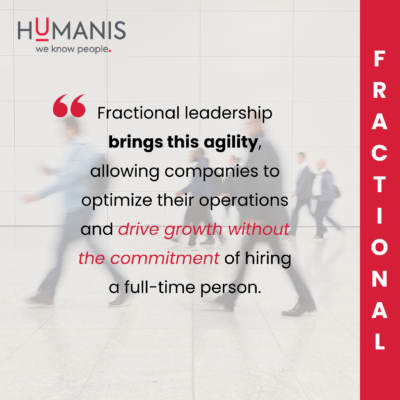

Written by: Raj Bhatti – Partner, Edmonton
Having been in the recruitment industry for well over a decade, I’ve seen firsthand the evolution of leadership roles, particularly the rise of interim and fractional work models. As businesses navigate increasingly complex environments, traditional executive hiring strategies are being rethought. One of the most powerful trends I’ve observed is the growing reliance on fractional leadership—and not just within the finance department, where fractional roles have been most common.
What is Fractional Leadership?
Simply put, fractional leadership refers to highly skilled executives who work part-time with multiple organizations, delivering the same expertise and impact as a full-time executive but on a more flexible basis. These leaders typically have other consulting or fractional work in their portfolio, allowing them to bring diverse industry insights to the table.
This isn’t a temporary fix. Unlike interim executives, who are full-time but short-term, fractional leaders often have ongoing roles without a defined end date. They are fully embedded within your team, involved in everything from strategy to day-to-day decision-making, while bringing a fresh perspective from their work in other organizations.
Fractional leaders are also distinctly different from consultants, who are typically brought in for their niche expertise on a specific project with a defined start and end date.
It’s important to note that while there are differences between fractional leaders, interim executives, and consultants, no one option is inherently better. Each offers distinct advantages depending on your unique business needs at the time. Additionally, there are still significant benefits to hiring a permanent leader. Fractional workers are a great complement to your existing workforce. It’s all about having a flexible approach to your talent strategy that can adapt to the changing needs of your business.
Why Fractional? Why Now?
The concept of fractional work has been around for a while, but its relevance has skyrocketed in recent years. Whether businesses are grappling with leadership gaps due to rapid growth, succession planning, or factors like illness, resignation, and early retirements, the need to fill these roles swiftly without sacrificing expertise is critical. Fractional executives provide immediate solutions, stepping into leadership roles quickly and seamlessly.
Additionally, versatility has become a core requirement for leadership. Leaders must navigate not only industry-specific challenges but also broader market shifts. The pool of fractional talent is expanding beyond the well-known fractional CFO role, as we now see leaders in operations, marketing, HR, and IT emerging across industries. Fractional leadership brings this agility, allowing companies to optimize their operations and drive growth without the commitment of hiring a full-time person.
Fractional leadership also offers flexibility for businesses to bolster specific functional areas without the financial burden. These leaders can step in to provide strategic oversight, optimizing team performance without adding full-time obligations such as vacation pay, benefits, or severance. Start-ups that can’t yet afford high-salary executives and growing companies needing an HR or marketing strategy benefit greatly from fractional leadership. According to Forbes, “the fractional business model saves payroll thousands of dollars or 30-40% over hiring a full-time employee.” It allows businesses to scale their workforce up or down as needed, a solution increasingly valuable in today’s dynamic environment.
Examples of Fractional Success
At Humanis, we’ve seen firsthand how fractional leadership can drive success across industries. In one case, a building materials manufacturing company needed leadership support to revamp their HR function and align it with organizational goals. The fractional HR leader reviewed and refined the company’s people strategy, enhancing talent acquisition, development, and retention. This led to significant improvements in HR performance and overall business effectiveness.
Another client in the professional sports industry needed financial leadership to ensure compliance and efficiency during a crucial period. A fractional VP of Finance stepped in, overseeing payroll, financial reporting, and compliance with salary cap regulations. This resulted in improved financial transparency and strengthened partnerships, contributing to the long-term sustainability of the organization.
The Future of Work is Flexible
Fractional leadership is proving to be a strategic advantage for businesses of all sizes and sectors. More companies are realizing the benefits of fractional leadership, whether to address temporary leadership gaps or to bring in specialized expertise for the long haul. These leaders aren’t just stopgaps; they are catalysts for growth, helping businesses navigate transitions, improve operations, and foster sustainable growth and success.
Ready to explore how fractional leadership can transform your business? Get in touch with our team today and discover how we can help you leverage fractional executives to build your company’s future success.